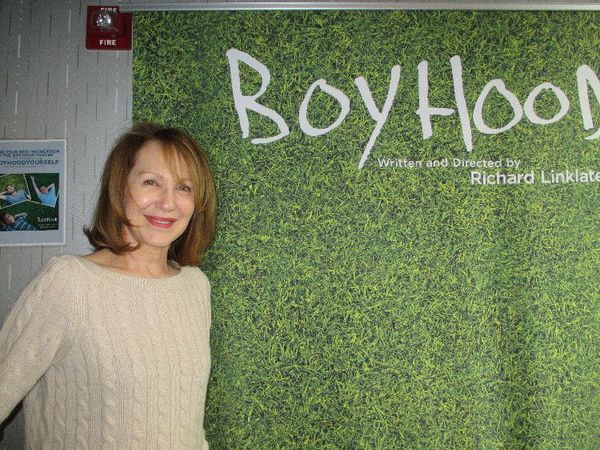 |
| Frédéric Tellier’s SK1 (L’affaire SK1) star Nathalie Baye having a Boyhood moment Photo: Anne-Katrin Titze |
Having worked with some of the best directors on both sides of the Atlantic - starting with Robert Wise and including François Truffaut, Jean-Luc Godard, Maurice Pialat, Claude Chabrol, Bertrand Tavernier, Steven Spielberg and even Guillaume Canet - Nathalie Baye comes to the 20th Anniversary of Rendez-Vous with French Cinema in New York with Frédéric Tellier’s intense thriller SK1 (L’Affaire SK1), co-starring Raphaël Personnaz and Olivier Gourmet.
Convicted murderer Guy Georges (Adama Niane), known as the "Beast of Bastille" due to his 11th arrondissement hunting ground, brutally raped and killed seven women over a period of years in the 1990s before a complicated investigation led to his arrest.
Baye is Maître Frédérique Pons, the lawyer who agreed to represent the man nobody wanted to defend. She "doesn't believe in the Devil," and Baye's sensitive portrayal makes it clear that there are no monsters, only people, even if they commit the most heinous crimes. Tellier brings us up-close to the investigators, especially Franck Magne, nicknamed Charlie (Personnaz) and Gourmet as Charlie's experienced colleague Bougon.
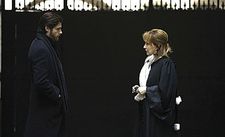 |
| Charlie (Raphaël Personnaz} with Maître Frédérique Pons (Nathalie Baye): "You notice how they hold each other in great esteem and there is a mutual admiration between the two." |
Anne-Katrin Titze: Before the film existed, how much were you affected by the real case of Guy Georges? Was it just another news story or did it have a special impact on you?
Nathalie Baye: I remember when it happened. The news item created a true psychosis in Paris. I remember that young girls or young women if they were living at home, and went out at night, parents were always saying, make sure somebody is with you or don't go out alone at night. It was really troubling and eerie for the city and it went on for quite a while.
AKT: We mustn't forget that the killings went on for several years.
NB: I think what was also troubling was that Guy Georges was in and out of prison throughout all these years, for robbery or something minor. Sometimes when he had a prison stint, nothing would happen. Sometimes there would be great gaps between one murder and the other, so you thought we'd be out of it and we weren't. That it wasn't consistent added to the confusion.
AKT: SK1 shows very well how this inconsistency added to the trauma. Was there a hesitation on your part before taking the role as Maître Frédérique Pons, the lawyer who agreed to represent the serial killer? Or did you admire her courage and were convinced to play her right away?
NB: I never hesitated for multiple reasons. The first is that I had great confidence in Frédéric Tellier. I knew he is a very honest person and I knew he would make a movie where he'd be scrupulous in telling the truth. At the same time, he would not turn it into a kind of drama to sensationalise. And I met the real lawyer. She actually still works as a lawyer to this day. When I met her, I think, she never actually thought that Guy Georges was innocent. Even though deep down she knew he was guilty, she made the decision to look for the man behind the monster.
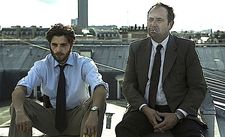 |
| Inspectors Franck Magne, aka Charlie, with Bougon (Olivier Gourmet): "That it wasn't consistent added to the confusion." |
AKT: These are two lines expressing that. Someone says about your character, that she "doesn't believe in the Devil," and that there really are no monsters. One of the most striking scenes is the one in which you are trying to convince him to bring closure to the victims' families. It's at the heart of the movie.
NB: Yes. It's a beautiful scene. It is a way not so much to redeem him but I would say that since the man accepts the truth, admits to something, he is to some extent freed from a big load. All those years in prison might help him - I'm not saying to be healed, because he is sick. At the same time, he might be able to show parts of himself that are himself and not the monster. When he was in prison, he actually asked not to be released because he was conscious that he would do it again.
AKT: He thoroughly denies responsibility for his future acts?
NB: I am going to tell you something that is not in the film that I was shocked by. One day I was in Toulouse for a Spanish film festival. Anyway, somebody said, there's someone who is working at the cinemathèque in Toulouse and he wants to talk with you. The film [SK1] hadn't opened yet at the time. And the man asked "you are in a film about Guy Georges?" And I said "yes". And he said, that Guy Georges lived in a squat for three or four years," we were five people, two women and three men, and I was one of the men. We were very close and he was a good boy."
And I asked "how was he with the girls?" [He said] "he was so sweet, so nice, and once we knew he was a serial killer, we couldn't believe it." One of the girls when he was in jail came and wrote to him for a while because for them he was just a good friend. It's a double personality. To them he was normal.
AKT: It is frightening. You would hear that in a lot of news stories reporting on neighbors talking about how nice someone was. SK1 is not a documentary. What are some of the moments when you took the liberty to make Fréd your own? Can you pinpoint when you knowingly take a step back from the real woman? Or is there no such distinction?
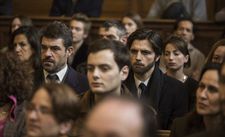 |
| Guy Georges trial courtroom: "I met the real lawyer. She actually still works as a lawyer to this day." |
NB: When you make a movie based on real people and you meet the people, you nourish yourself with who they are. And then you get to a stage where you take what you saw and you make it your own and after that it's behind you. Then there is just the filmmaker and the script and the actor. At that point, you take flight and you act and you forget everything.
AKT: Can you talk about your work with Frédéric Tellier? You worked with so many great directors, what makes his approach special?
NB: There are some filmmakers who have a really strong sense of filmmaking, of cinema, and they are very solid in terms of technique. Paradoxically, they have a certain fear of actors. They don't know actors well. On the other hand, Frédéric knows actors and loves actors. I would say that he directs us with great intelligence and precision and a great extent of sensitivity.
AKT: What you are saying makes me think of a scene during which your character meets Charlie in the Court's courtyard. It doesn't drive the plot, there is nothing much going on. It seems that the director wanted to have you and Raphaël Personnaz's character meet. I like the scene.
NB: It's a lovely scene, a small scene. The only one I have with Charlie. You notice how they hold each other in great esteem and there is a mutual admiration between the two. They do recognise that they got involved in something that devoured them and took over their lives. It was a huge investment for both of them. At a time they had cross purposes but they were united by pride to be involved in that. That scene was an idea of Frédéric's, it didn't happen in reality.
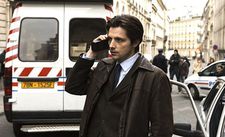 |
| Raphaël Personnaz as Charlie: "It was really troubling and eerie for the city and it went on for quite a while." |
AKT: That's what I thought. Ultimately, it is a film about doubt. And that includes the positive aspects of doubt. Not to be certain of monsters and everything you are doing. It is a beautiful dance of doubt.
NB: That's right. I agree. You are right. The story is so incredible, you can never be absolutely sure what is the truth. When Guy Georges says "yes it's me" - the actor Adama Niane is incredible.
AKT: Yes, he is. It also shows how important it is to hear someone admit to something. That touches something that doesn't have to be on the criminal level. You are only in the scenes that take place later chronologically in the movie. How did you feel seeing it all come together when you watched it the first time?
NB: Watching a film that I'm in is always very difficult for me. I don't like watching myself. Maybe when the film was made ten years ago.
AKT: I like watching you.
NB: There's different approaches actors take to watching themselves. Often there is a kind of narcissism that I find completely legitimate. However, as far as I'm concerned, I love getting lost in my characters, or finding myself in them.





















